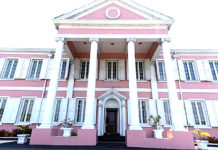 <<< Minister of State for Finance the Hon Zhivargo Laing (at the podium) at The Nassau Conference, November 18.
<<< Minister of State for Finance the Hon Zhivargo Laing (at the podium) at The Nassau Conference, November 18.
NASSAU, Bahamas – The goal of the Ministry of Finance is to preserve the financial services sector by getting the country off any list that could result in sanctions by the world’s most developed countries, the Minister of State for Finance the Hon Zhivargo Laing said.
“This much we know, whatever the current evolved or evolving standards that we are asked to meet, The Bahamas must have a strategic vision for the further growth and development of its financial services sector and we do,” Mr. Laing said.
He was addressing The Nassau Conference sponsored by the Association of International Banks & Trust Companies in The Bahamas, held at the British Colonial Hilton. The theme was: ‘Private Wealth Management: The Changing Dynamics’.
The Nassau Conference, started five years ago, is a forum in which financial services professionals share views on issues impacting the industry.
Mr Laing led a panel discussion on ‘The Bahamas Status & Strategy Towards Tax Information Agreements’, and shared the country’s position on this issue.
“Can we compete in the twenty-first century in the new and evolved global regulatory environment that we are in? Yes we can! Must we compete in the Twenty-first Century? Yes we must!” Mr. Laing said.
In the wake of the current financial crisis, there has been a renewed focus on offshore financial centers and new initiatives.
It is fuelled by the Group of 20 countries whose leaders have mandated international standards setting organisation such as the Organisation for Economic Cooperation and Development and the Financial Action Task Force to “take action against non-cooperative jurisdictions, including tax havens and to deploy sanctions to protect public finances and financial systems,” Mr Laing explained.
Furthermore, the G-20s have adopted a standard of having a minimum of 12 Tax Information Exchange Agreements (TIEA) in order to be regarded as cooperating in matters of tax information exchange transparency.
“While we can wrestle with the moral arguments about this exercise by the world’s most developed countries, keeping it real, I should simply wish to point out that there is not a jurisdiction in the world that is not moving aggressively to meet the standard set by them,” Mr. Laing said.
“It is the reality of the virtual playing field on this issue that enables us to move forward because while we had committed to the principle of transparency in 2000/2001, we insisted in our letter to the OECD that we would do so when the playing field was level.”
The Bahamas has signed TIEAs, with the United States, San Marino, Monaco, the United Kingdom and New Zealand. Negotiations are being held with other countries and the government expects to meet the 12-signed TIEAs goal by the end of this year.
“Regardless of what is happening in the world, there is a strategic focus that we must have in order to grow and develop our financial services sector and to compete,” said Mr Laing. “This begins with a strategic vision for the sector.
“Our goal in this exercise of complying with the evolved and evolving standards of the OECD/G-20 has always been clear – preserve the financial services sector of this nation by getting us off any list that was likely to result in sanctions by the world’s most developed countries and economies, sanctions that would make it improbable or impossible for many, if not most of the existing and potential clients of our jurisdiction from doing business here.”
Specific areas of opportunities are in private wealth management, international insurance, fund management and administration, international maritime services, international aviation services, corporate headquarters, E-commerce/data services, and an arbitration centre, he said.
When these areas have been developed, it is believed these will sustain and grow the existing financial services contribution to the economy, Mr. Laing said.
The financial services sector contributes 15 percent of the country’s Gross Domestic Product. It employs about 5,000 people, 80 percent of whom are Bahamians and pays an average annual salary of $50,000, he said.







